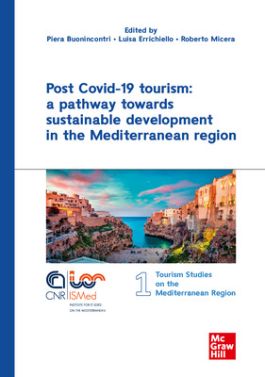POST COVID-19 TOURISM
Capitolo 1 - Sustainable tourism: Measures, evidence and future prospects
Capitolo 2 - The invisible link
Capitolo 3 - Encouraging the circular economy in the tourism sector through industriai symbiosis
Capitolo 4 - Tourism in the Mediterranean area between fragility, crisis and new frontiers of development: Comparison of practices
Capitolo 5 - Sustainable tourism development: Best practices and inland areas
Capitolo 6 - Local sustainable development in Crete: The case of the "Minoan Path" cultural route
Capitolo 7 - The role of agritourism sustainable business model during Covid-19
Capitolo 8 - Circular economy and sustainability practices for tourism development: Tnsights from a tourism case study
Capitolo 9 - Remote workers and sustainable tourism. New challenges for small Italian villages in the post Covid-19 era
Capitolo 10 - Residents' perceptions and attitudes towards climate change: Insights from an island tourism destination
Capitolo 11 - Evaluation of tourist's motivation in Covid-19 situation
Capitolo 12 - Do tourism providers know their visitors' online behavior? Aninvestigation of digitai customer Journey at a Mediterranean destination
Capitolo 13 - Socio-Economic sustainability of cultural tourism in Mediterranean during the Covid-19 pandemie
Capitolo 14 - Palestine recovery plan for welcoming back tourists
The book series “Tourism Studies on the Mediterranean Region”, launched in 2021 by the Institute for Studies on the Mediterranean (ISMed) of the National Research Council of Italy (CNR), is focused on state-of-the-art research and practice on tourism in Mediterranean countries and islands. It proposes an integrated analysis of how geopolitical, socio-economic and cultural variables are interrelated with tourism activities in the Med area and a critical evaluation of policies and measures that industries and governments have to look at to boost tourism economies and promote the structural transformation of the sector towards environmental, socio-economic and cultural sustainability.
The aim of the first volume of the book series “Tourism Studies on the Mediterranean Region” is to offer new and critical perspectives on sustainable development in the Mediterranean countries and islands and provide ground evidence about how sustainable development research and practice can support the “new normal” of tourism and the structural transformation of the sector that is needed in light of the pandemic disease. The focus will be on the future shape of tourism after COVID-19 and the evolutionary trajectories of this sector both at the level of businesses and at the level of destinations in its transition towards more resilient and sustainable economies.
The chapters included in this book businesses a variety of topics related to the sustainable development of tourism in the post-pandemic era. Specifically: Sustainable tourism in the Mediterranean Region, with particular attention to the theoretical perspectives and measurement tools for the post-Covid era; Sustainable development of Mediterranean destinations: learning from best practices; Innovation for sustainability: the response of the hospitality system to the pandemic crisis; The role of residents and tourists to address the challenges of sustainability; Policy interventions and recovery plans after the pandemic. By embracing different perspectives, adopting different level of analysis and taking into account different aspects and issues of the same phenomenon, all the chapters provide fresh critical reflections on the effects that the Covid-19 pandemic can produce on the tourism sector in the Mediterranean region and in its various countries and islands by shaping its potential trajectories towards sustainability. This original collection of works contributes to advance state-of- art knowledge on the topic of sustainability, shedding shed light on current trends and future dynamics of sustainable tourism, also in light on the pandemic crisis and its effects at both business and destination level. In this vein, the book can be a valuable reference on the topic for both for the academic community and practitioners.
Piera Buonincontri, PhD, Researcher at the Institute for Studies on the Mediterranean (ISMED)
of the National Research Council of Italy (CNR), Expert in Marketing and tourism management.
Luisa Errichiello, PhD, Researcher at the Institute for Studies on the Mediterranean (ISMED) of
the National Research Council of Italy (CNR), Expert in Change and innovation management.
Roberto Micera, PhD, Senior Researcher at the Institute for Studies on the Mediterranean
(ISMED) of the National Research Council of Italy (CNR), Expert in Tourism management and
marketing.

